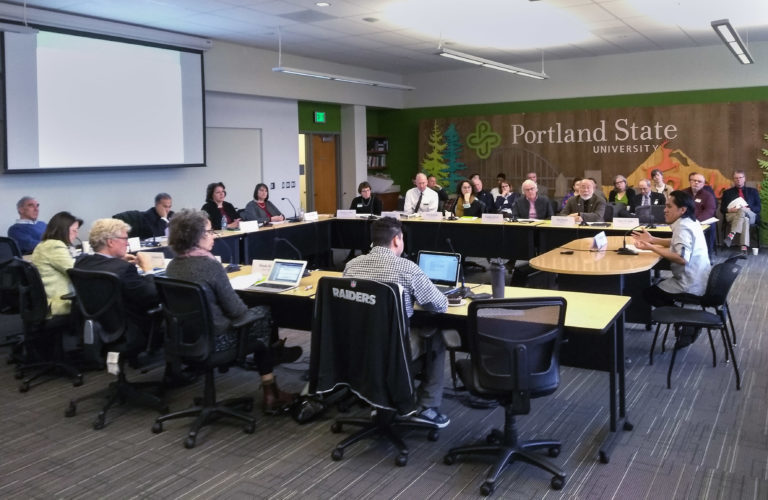Portland State’s Board of Trustees gathered on Jan. 24 in the fifth-floor conference room at the Academic and Student Recreation center to address imminent budget battles, barriers to student success and upcoming reports on a comprehensive review of campus public safety policy.
Budget outlook remains bleak
In her report to the Board of Trustees, Chair Gale Castillo said she was “quite disappointed” with a recent meeting with Oregon Gov. Kate Brown, university presidents from across the state and other Board chairs to discuss the lack of increased higher education funding.
“It was a very shocking, very upsetting meeting and it just underscores the comments that were made earlier about how we all need to work together,” Castillo said.
The governor’s proposed budget included no changes in funding levels for higher education across the state, which translates to a cut of approximately $20 million statewide due to the increased costs in maintaining current service levels.
Castillo and several other Board members made comments stressing the need to work together in lobbying the state for additional funds. This came as a direct response to PSU student government’s refusal to lobby until the administration commits to no tuition increases and a transition toward a tuition-free funding model.
Associated Students of Portland State President Luis Balderas-Villagrana addressed the Board on behalf of student government explaining their refusal to lobby state legislators and outlining additional concerns over equity, affordability and transparency.
Campus public safety review
Margolis Healy, an external consulting firm undertaking a comprehensive review of campus public safety policy, notified the Board that its final report will be complete in time for a special Board meeting on Feb. 5.
PSU President Rahmat Shoureshi said the administration has yet to receive the final report, and that it will be posted publicly online and shared with the Board simultaneously.
“There will be no advance reading of [the report] ahead of the community and the public,” he said.
Pressure on the Board to address concerns over campus policing policies reached a head last fall when a 10-day student occupation of the Campus Public Safety Office culminated in a Board meeting where a majority of student, faculty and community members called on the Board to disarm campus police officers.
During a listening forum on campus, Steven Healy, CEO of Margolis Healy, said his firm had not previously addressed questions of disarmament on campus, but they would include a consideration in the potential proposals for the university following their review.
Student Success
Shoureshi emphasized a commitment to students during his report to the Board.
“We are all here because of students,” Shoureshi said. “As I have said before, my number one priority is student success.”
Student success is currently defined by the administration as increased retention and graduation rates.
The university is seeking an additional $60 million from the state on top of the $120 million required to maintain current service levels and keep tuition hikes below 5 percent. The additional $60 million would be required to go toward programs for improving student success and reducing debt.
The Oregon Higher Education Coordinating Commission recently established criteria for approving any tuition increases over 5 percent. One of the three criteria include “safeguarding access and support for degree completion by historically underrepresented students.”
Margaret Kirkpatrick, chair of the Academic and Student Affairs Committee highlighted two areas where resource gaps are creating barriers to success for underrepresented students.
“The number of disabled students in the PSU student population has been increasing for the last few years, and the resources we have to dedicate to those students haven’t been keeping up with demand,” Kirkpatrick explained.
The other primary gap existed in the need for emergency funds, which are used to assist students who experience short term financial challenges.
Sukhwant Jhaj, vice provost for academic innovation and student success at PSU and the person most responsible for spearheading efforts to improve student success, has announced a planned departure at the end of the year.
The Board also announced several vacancies on the Board starting after June 30 of this year, and are currently identifying and contacting potential candidates to replace the outgoing Board members.
“We only submit our suggestions to the governor’s office,” Castillo said. “They’re the governor’s appointments.”
Having been raised by feral pandas in the remote forests of Chengdu, China has always formed a key part of my identity. After my career as a Hong Kong film producer was derailed by tabloid journalists, I knew I had found the work that would become my life’s purpose. I am passionate about journalism because it allows me to step into worlds I would otherwise never know while channeling my curiosity toward serving and informing the community.





